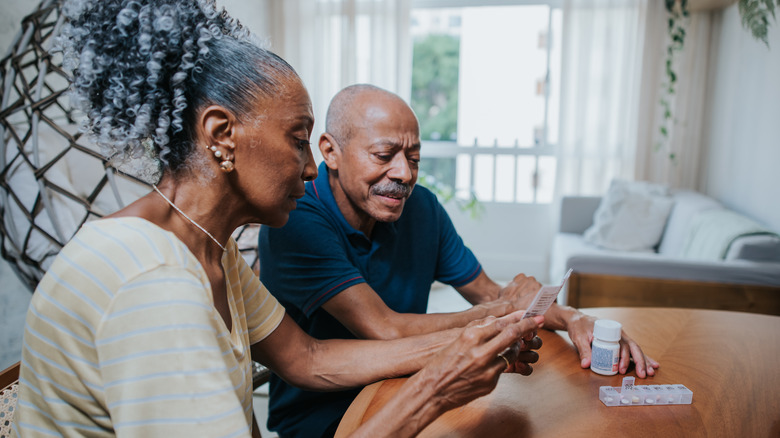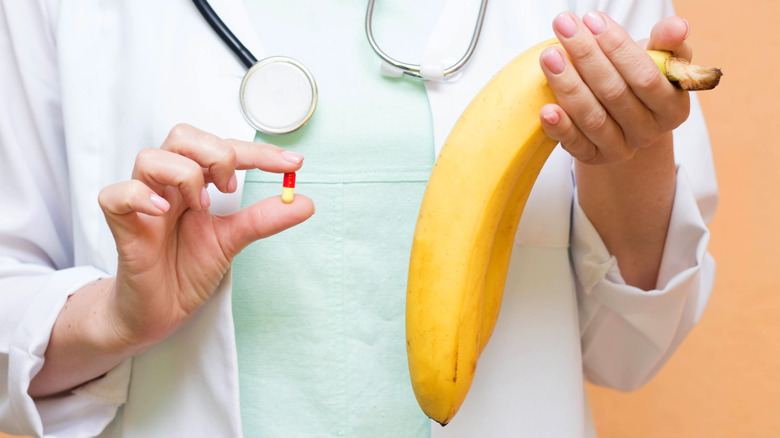Avoid Eating Bananas If You Take These Common Medications
If you're someone who enjoys bananas on a regular basis, you're giving your body a healthy dose of vitamins and minerals each time you eat one of those ripe, golden fruits. According to the U.S. Department of Agriculture (USDA), one medium-sized banana is packed with more than 3 grams of fiber, nearly 32 milligrams of magnesium, 26 milligrams of phosphorus, roughly 6 milligrams of calcium, and much more. Where you're really getting your money's worth, however, is in bananas' potassium content. In that same-sized banana, you'll find an impressive 422 milligrams of potassium.
Without potassium, our body would be lacking its key player for metabolizing carbs, regulating heartbeat, and promoting nerve and muscle function (via Harvard Health Publishing). While the nutrient is critical to our health, bananas can cause problems for people taking certain medications. Oftentimes, food-drug interactions get overlooked, as we tend to focus more on potential negative interactions between multiple medications. However, people taking certain blood pressure drugs, specifically ACE inhibitors, will want to steer clear of bananas.
ACE inhibitors can cause potassium to build up in the blood
Blood pressure readings consist of two parts: systolic blood pressure and diastolic blood pressure. The top number is our systolic blood pressure measurement, or the amount of pressure placed on the inside of the blood vessels with every heartbeat, explains the U.S. Food and Drug Administration (FDA). Our diastolic blood pressure is the bottom number that tells us how much pressure our blood places on our arteries between heartbeats. Hypertension, or high blood pressure, is a reading of 130/80 or higher.
Medication is one way to manage high blood pressure, and angiotensin converting enzyme (ACE) inhibitors are among the more common blood pressure-lowering medications taken by patients, accounting for 35% of all antihypertensive prescriptions in the U.S. (via The Journal of Allergy and Clinical Immunology). ACE inhibitors work by stopping molecules from constricting the blood vessels (via Stat News). As a side effect, however, ACE inhibitors can cause potassium to accumulate in the body. Because of this, the last thing we need is any more potassium.
What is hyperkalemia?
In a 2019 case report published in Annals of Cardiac Anaesthesia, the researchers described two patients who had developed a potentially fatal condition known as hyperkalemia, in which a person has an excess of potassium in the blood. Both patients had been taking ACE inhibitors along with spironolactone, another blood pressure treatment drug that acts as a diuretic. Both patients were found to have developed hyperkalemia as a combined result of the medications and a high banana intake of approximately seven fruits per day. For one patient, this daily banana consumption had been ongoing for the last three weeks, and for the other patient, for the last 15 days.
While hyperkalemia is considered a rare condition, individuals with certain health conditions or those taking specific medications like ACE inhibitors may be at higher risk (via the Cleveland Clinic). Therefore, you'll want to discuss any concerns about food-drug interactions with your doctor. Maintaining a healthy weight, getting routine exercise, limiting one's intake of salty foods, and avoiding smoking and alcohol are lifestyle habits that can also help manage blood pressure levels.



